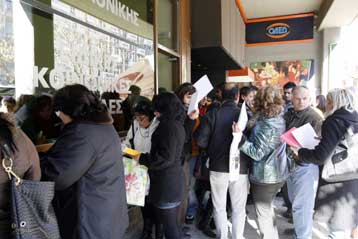
Youth unemployment (aged between 15 and 24) in Greece has reached 24.2 per cent in the first quarter of 2009, with 86 000 people out on the job market, according to a Eurostat report that was published yesterday. At the same time, unemployment in the EU has reached 18,5 per cent with 5 million people looking for employment.
Based on Eurostat data, unemployment for young women in Greece is up to 31,8 per cent (with the percentage in rest of the EU member states being in half) and 18.3 per cent for young men (in line with the first quarter numbers for the rest of the EU). According to statisticians, youth unemployment in Greece is up 2.2 per cent in the first quarter of 2009, meaning that the number of unemployed has risen from 77 000 to 86 000. For the rest of the EU members, the percentile increase is 3.7 (from 14.6% to 18.3%).
For the EU of the 27, unemployment among the young has increased in 26 of the member states, except for Bulgaria, where the percentage has actually fallen. Latvia has witnessed the steepest increase in unemployment (from 11% for the first quarter of 2008 to 28,2% for the same period in 2009). The situation is no different in Estonia (from 7,6% to 24,1%). In total, because of the crisis, unemployment among young people is rising faster than unemployment as a whole, both in the EU and the Euro zone.
In the meantime, citizens of Salonika in Northern Greece share the fear of losing their jobs on their return from the summer holidays. The situation is clearly becoming worse and working hour cuts, from a five day working week to a four and a three day week, becoming normal. Furthermore, wage cuts of up to 50% accompany the pressing measures against the drastic decrease in demand and the shrinking economy. The data was released by Sotiris Zaryanopoulos – head secretary of the Salonika Center for the Workers, during a press conference organized by the political formation PAME.
He added that employers in Salonika and Kilkis are refusing to pay their workers’ wages for months now, using the recession as an excuse. For this reason, people from PAME announced the planned opening of two offices, providing information on employment law and rights for immigrants and workers. Mr Zaryanopoulos concluded: “The climax of our initiative will be in September, during the Salonika Fair protest rally.”
Another warning for a “hot summer”, filled with protests was launched by Kostas Psihoios – chairman of the Syndicate of Private Workers.